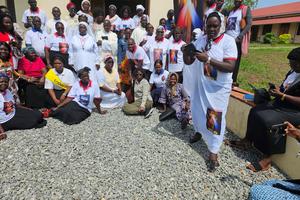Father Seraphim Michalenko (1930-2021)
Father Michalenko was committed to speaking about the message of Divine Mercy and promoting the mercy of God.

Father Seraphim Michalenko of the Marian Fathers of the Immaculate Conception, one of the world’s leading experts on Divine Mercy and St. Faustina, died at the age of 90 on Feb. 11 at Berkshire Medical Center in Pittsfield, Massachusetts, near the National Shrine of the Divine Mercy in Stockbridge.
A priest for 64 years, Father Michalenko was the vice postulator for the cause of beatification and then the canonization of St. Faustina. He had even personally witnessed the miracle for her beatification when it took place.
Father Michalenko was committed to speaking about the message of Divine Mercy and promoting the mercy of God.
Even as a youngster he never seemed far away from the Divine Mercy message. He grew up in the town of Adams, Massachusetts, and attended St. Stanislaus Kostka Church 30 miles north of what would later become the Marian Fathers’ Eden Hill and decades later the National Shrine of the Divine Mercy. As a young teenager he learned about Divine Mercy as his parish became the first church in the Western Hemisphere to enshrine an image of the Divine Mercy. At this time, he also learned about Faustina from a Marian priest who visited his family. In addition, his parents obtained an image of Divine Mercy, and, as he said in an interview in later years, “we hung it in our house. That’s how I found out about Divine Mercy.”
He said that in high school God called him to be a priest with the Marians. Recalling his vocation, he would later say, “And dedicating my life to spreading Divine Mercy, a work entrusted to the Marians, turned out to be God’s plan for me.”
That it was.
By 1979, he was officially appointed as vice postulator in North America for then-Sister Faustina’s canonization cause. In the same decade he went to communist-occupied Poland and smuggled out pages of St. Faustina’s diary as photographic images.
By October 1995 he was assigned to promote the message and devotion of Divine Mercy full time as well as continue work on St. Faustina’s canonization cause, which came to fruition when Pope St. John Paul II canonized her in 2000 as the first saint of the new millennium.
He died on Feb. 11, the feast of Our Lady of Lourdes, a feast day of note for his Marian order for how Mary identified herself at those apparitions — “I am the Immaculate Conception.”
Marian Father Kaz Chwalek, provincial superior of the Blessed Virgin Mary, Mother of Mercy Province of the Congregation of Marian Fathers of the Immaculate Conception, explained on the Marian Fathers’ website: “There are two days when Our Lady and the mystery of her Immaculate Conception is celebrated: the Solemnity of the Immaculate Conception, celebrated on Dec. 8, and the feast of Our Lady of Lourdes. The Immaculate Conception, patroness of the Marian Fathers' Congregation, prepared her special son to enter into the Father’s House on her special feast.”
Personally, I remember meeting Father Michalenko in the mid-1990s at the Stockbridge shrine, around the time when he was promoted to that full-time work promoting the mercy message.
I interviewed him for an article for the Register on the Divine Mercy message. Father Michalenko had along with him another leading Divine Mercy expert, Father George Kosicki.
Here were two of the world’s most renowned experts on Divine Mercy and Faustina, yet how gracious both were during an unhurried interview that went on for what must have been at least two hours. Father Michalenko’s eagerness (as well as Father Kosicki’s) to share so much was a blessing for me as a writer.
To share just one of the things he stressed, Father Michalenko said the Divine Mercy message and devotion must be a grassroots effort to spread, which it has become. I mentioned how well it was going at the time, with about 15,000 people showing up at the shrine in Stockbridge, Massachusetts, to celebrate Divine Mercy Sunday. His answer was that he wanted to see them celebrate Divine Mercy Sunday in their parishes — which has been coming to pass, as churches around the country have slowly but surely been bringing home the message and devotion on Divine Mercy Sunday.
Rest in peace, mercy messenger.
- Keywords:
- Father Seraphim Michalenko of the Marian Fathers of the Immaculate Conception
- divine mercy
- divine mercy message















